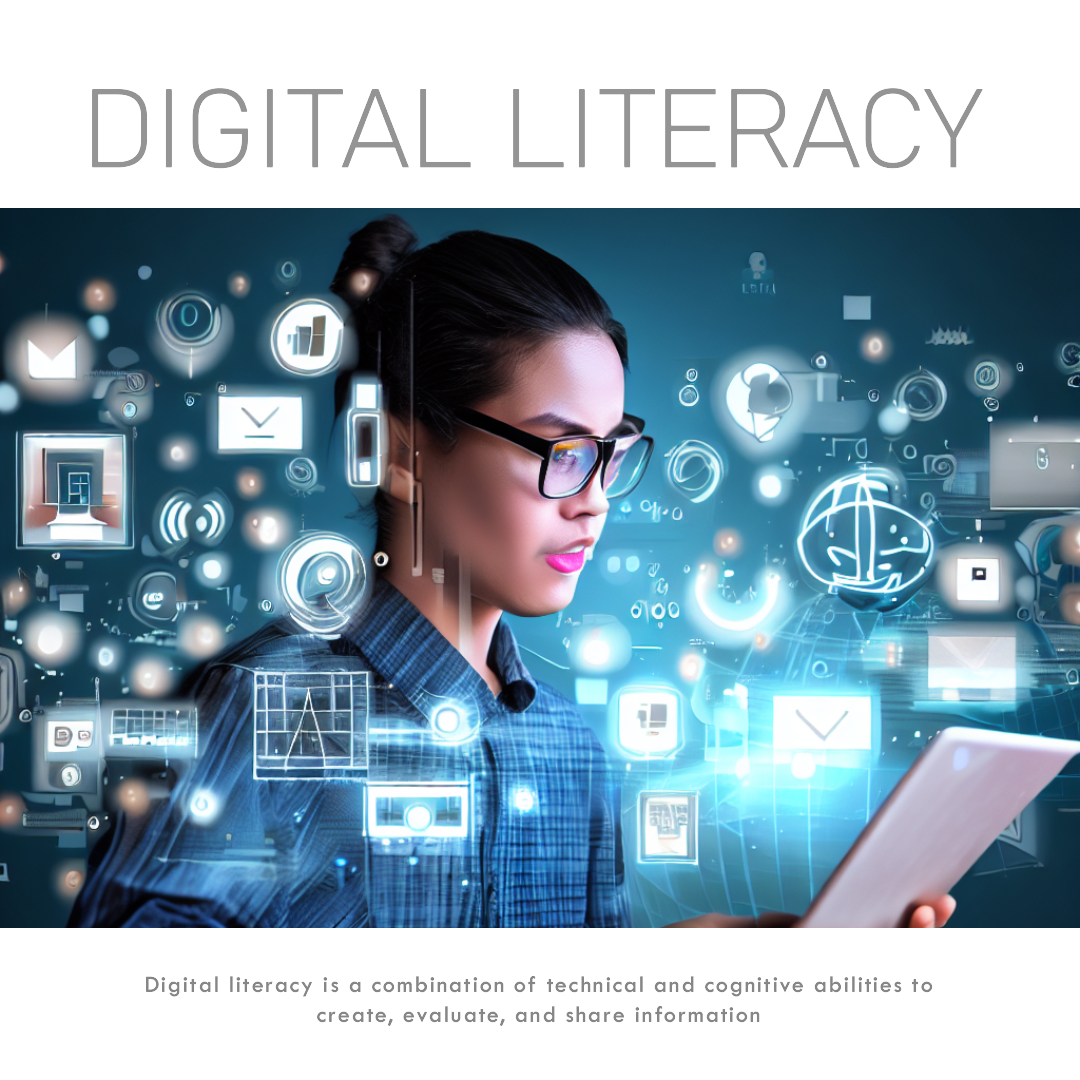Digital Literacy
Digital literacy is a combination of technical and cognitive abilities to create, evaluate, and share information.
Digital literacy is essential for participating fully in modern society, as more and more information is being created, shared, and accessed digitally. It involves basic computer and software skills, information literacy, media literacy, and critical thinking.
| Digital Literacy (role) | |
|---|---|
| Title | Digital Literacy |
| Description | Digital literacy is a combination of technical and cognitive abilities to create, evaluate, and share information. |
- Snippet from Wikipedia: Digital literacy
Digital literacy is an individual's ability to find, evaluate, and communicate information using typing or digital media platforms. Digital literacy combines technical and cognitive abilities; it consists of using information and communication technologies to create, evaluate, and share information, or critically examining the social and political impacts of information and communication technologies
Digital literacy initially focused on digital skills and stand-alone computers, but the advent of the internet and social media use has shifted some of its focus to mobile devices.
Areas of Interest:
- Basic computer skills
- Internet and web browsing
- Email and communication
- Social media
- Digital security and privacy
- Information literacy
- Media literacy
- Digital content creation
- Cloud computing and file management
- Programming and coding
- Digital accessibility
- Cybersecurity
- Online research
- Digital citizenship
- Online learning
- Digital marketing
- Digital design
- Data analysis
- Digital project management
- Artificial intelligence
Digital literacy is important because it allows individuals to effectively participate in the digital world, which has become a vital aspect of modern life. It is essential for accessing education, employment, healthcare, and government services. It also enables individuals to communicate and collaborate with others, access information, and participate in civic and social activities.
Basic digital literacy skills include understanding how to use digital devices, such as computers and smartphones, navigating the internet, creating and managing email accounts, using social media platforms, and using common software applications such as word processors and spreadsheets.
Media literacy is a component of digital literacy that focuses on the ability to critically analyze and evaluate media messages, including those presented in digital media. Media literacy includes the ability to identify bias, recognize persuasive techniques, and evaluate the credibility of sources.
There are many ways to improve digital literacy skills, including taking online courses, reading digital literacy resources and guides, practicing with digital tools and software, and seeking help from digital literacy experts or mentors.
Digital literacy skills are important for everyone, regardless of age, occupation, or background. It is essential for students, job seekers, and those seeking to advance their careers. It is also important for seniors, people with disabilities, and other underserved populations who may face barriers to accessing digital technology.
Some challenges associated with digital literacy include the digital divide, which refers to unequal access to digital technology and resources, as well as the potential for misinformation and digital scams. There is also a risk of digital overload or addiction, where individuals may become overly reliant on digital technology to the detriment of their physical and mental health.
Benefits of Digital Literacy
- Increased access to information: Digital literacy allows individuals to access and use digital technologies to find and share information, increasing their knowledge and understanding of various subjects.
- Improved communication: Digital literacy enables individuals to communicate effectively using digital tools, allowing them to connect with others across distances and time zones.
- Enhanced employability: Digital literacy is becoming increasingly important in the workplace, with many jobs requiring basic digital skills. Improving digital literacy skills can increase job prospects and career advancement opportunities.
- Increased productivity: Digital literacy allows individuals to work more efficiently and effectively, automating tasks and streamlining workflows.
- Improved education outcomes: Digital literacy can enhance learning outcomes, enabling students to access educational resources and communicate with teachers and classmates more effectively.
- Improved health outcomes: Digital literacy can improve access to healthcare information and services, enabling individuals to make informed decisions about their health and wellbeing.
- Increased civic engagement: Digital literacy can enable individuals to engage more effectively in civic and social activities, from participating in online communities to accessing government services and information.
- Improved creativity and innovation: Digital literacy can enable individuals to create and share digital content, fostering creativity and innovation.
External links:
-
- Working with computers
- Working and collaborating online
-
- Independent research
- Familiarity with terms and common platforms
- Collaboration
- Adapting to new technology
- Teaching or explaining technologies you use
## ToDo ##
- Support Us... →
- Social media
- Cybersecurity
- Online privacy
- Digital citizenship
- Online communication
- Internet safety
- Online identity
- Digital footprint
- Digital communication
- Online behavior
- Digital ethics
- Information literacy
- Digital literacy skills
- Digital health
- Digital well-being
- Online learning
